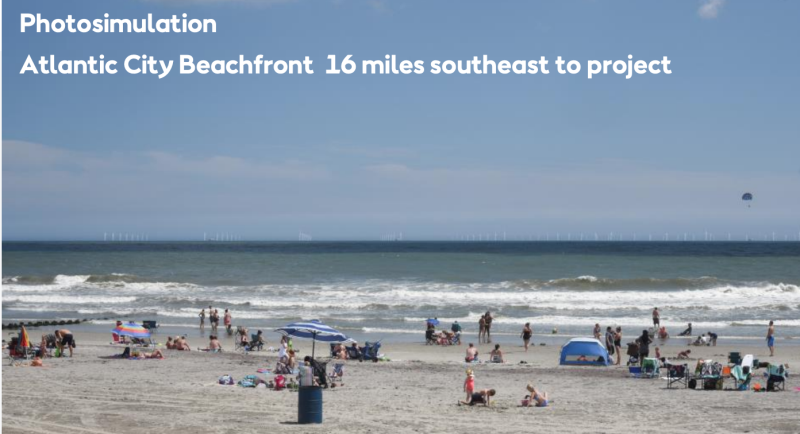On May 22 the Bureau of Offshore Energy Management announced that it had completed its environmental assessment of Ørsted’s Ocean Wind 1 project, a planned array of up to 98 wind turbine generators and three offshore substations.
With a projected maximum nameplate capacity range of 1,225 megawatts to 1,440 MW, Ocean Wind 1 is a centerpiece for New Jersey Gov. Phil Murphy’s administration and its ambitions to have New Jersey reliant on renewable energy sources by mid-century.
Ocean Wind is the third commercial-scale U.S. project in federal waters. Construction is apace at the Vineyard Wind 800-MW project off southern Massachusetts, after the 710' Belgian-flagged installation vessel Orion began setting the first of six monopile foundations and transition pieces in late May. The U.S.-flagged 253’ OSV Atlantic Oceanic worked alongside to deploy a “bubble curtain” – a sound-mitigation system to reduce the noise of pile-driving operations, and its effect on marine mammals and other sea life.
In New Jersey, the performance of Vineyard Wind’s system will be watched closely by offshore wind backers and critics alike. Opponents linked survey work for wind projects to the deaths of whales and dolphins along the coast, and that had the effect of reducing public support for offshore wind power development, with 35% of residents supporting the projects and 39% saying the projects should be halted, according to a Fairleigh Dickinson University poll. State officials are under heavy political pressure from offshore wind critics and Republican legislators who are calling for a moratorium on the projects.
“If we’re going to meet the Murphy administration’s green energy goals, New Jersey needs to build a lot of wind farms, and fast,” said Dan Cassino, a professor of government and politics at Fairleigh Dickinson in Madison, N.J., and director of the FDU Poll. “But the administration just hasn’t convinced the public that it’s a good idea.”
Since a series of whale and dolphin strandings began in December 2022, wind power critics argued there could be a link between the deaths and offshore survey work on energy lease areas. The Murphy administration and federal officials insist there is no proof of a link and rejected calls for a moratorium, but “such arguments seem to be effective,” according to an FDU Poll summary released May 11.
“In the survey, respondents were randomly assigned to be asked about the offshore wind farms in a question that included a mention of the whale and dolphin deaths, or a version without it,” the report said. “Even though the question noted that there was no known link between the deaths and the wind farms, it significantly reduced support for the development of offshore wind.”
“The argument that the wind farms are hurting cute, smart animals just craters support,” said Cassino. “People concerned about the environment want to have green energy, but put that up against dolphins, and the dolphins are going to win every time.”
The pace of marine mammal strandings has slowed since late March, but months of reports appear to have had as deep affect. The poll of 817 respondents from April 28 to May 6 found support for wind power projects drop sharply when pollsters asked about whale and dolphin deaths.
When the question about wind farms doesn’t mention the deaths of whales and dolphins, 42% of New Jersey residents say that the state should continue development, with 33% saying that it should be stopped, a nine-point margin in favor of development, according to the FDU Poll findings. But in the version that does mention the deaths, only 28% say that development should continue, with 46% saying that it should be halted. This difference is mostly driven by Democrats. Among Democrats, mentioning the whales and dolphins reduces support for continued development of offshore wind by 24% (from 65% to 41%); among Republicans, it reduces support by 12% (from 27% to 15%).
Public opposition to wind projects has been loudest in Jersey Shore resort communities like Long Beach Island and Ocean City. But the poll found little significant difference of opinion between coastal and inland areas.
“In the coastal counties of Atlantic, Cape May, Monmouth, and Ocean, 44% say that development should be halted, with 33% saying that it should continue,” the poll summary states. “This is no different than the 41% who want to halt development from the northwest corner of the state, or the 46% in South Jersey. Support for the wind farms is highest in the urban core counties of Essex, Hudson, Mercer, Middlesex, and Union counties.”
The poll did find a clear partisan split on basic support for offshore wind projects.
“Democrats are much more likely than Republicans or independents to support the continued development of the wind farms. A bare majority (53%) of Democrats say that development should be continued, with just 21% saying that it should be stopped,” the report said. “Among Republicans, this is almost entirely reversed, with 21% supporting the projects, and 62% saying that they should be stopped. Independents are almost exactly in the middle, with 47% saying that development should be halted.”
“This isn’t a regional issue in New Jersey,” said Cassino. “Whether you’re actually going to see the offshore wind farms doesn’t matter nearly as much as whether you’re a Republican or a Democrat.”
As the state's summer beach season opened, Cape May County officials said they may join other groups already in court in challenging the Ocean Wind project's federal and state environmental permits. Off New Jersey’s southernmost beaches, the appearance of turbines away could reduce tourism visitation by 15%, at a loss of $1 billion to the county’s economy, heavily dependent on the three- to four-month summer beach industry, according to county officials.




